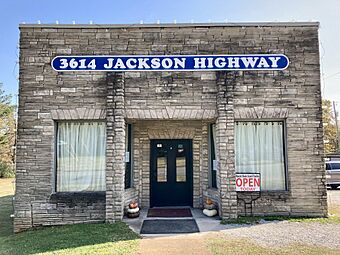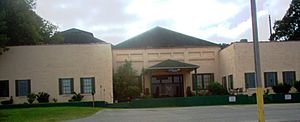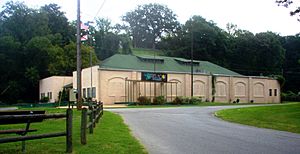Muscle Shoals Sound Studio facts for kids
Quick facts for kids |
|
|
Muscle Shoals Sound Studio
|
|

Original studio at 3614 Jackson Highway, Sheffield
|
|
| Location | 3614 Jackson Hwy., Sheffield, Alabama |
|---|---|
| Architectural style | Early commercial |
| Website | muscleshoalssoundstudio.org |
| NRHP reference No. | 06000437 |
| Added to NRHP | June 2, 2006 |
The Muscle Shoals Sound Studio is a famous recording studio located in Sheffield, Alabama. It was started in 1969 by four talented musicians. These musicians were known as the Muscle Shoals Rhythm Section. They decided to leave another nearby studio, FAME Studios, to create their own place for making music.
Many well-known artists from the United States and Great Britain came to record here. Some of the famous musicians who recorded at Muscle Shoals Sound Studio include Bob Dylan, the Rolling Stones, Aretha Franklin, Paul Simon, Rod Stewart, and the Black Keys.
Contents
History of the Studio
The Founding Musicians
The four musicians who started the studio were Barry Beckett, Roger Hawkins, Jimmy Johnson, and David Hood. They were all session musicians at Rick Hall's FAME Studios. They were officially called the Muscle Shoals Rhythm Section, but many people knew them as "The Swampers." They helped create a special "Muscle Shoals sound" that became very popular.
The Muscle Shoals Rhythm Section was unique because they were the first group of musicians to own their own studio. They also ran their own companies for publishing and producing music. They played instruments and helped arrange songs for many recordings. This included big hits for artists like Wilson Pickett, Aretha Franklin, and the Staple Singers. Many other popular artists also recorded hit songs and full albums at their studio.
They first started working together in 1967. They played sessions in New York and Nashville before coming to FAME. Their early success in soul and R&B music led to more rock and pop artists wanting to record at Muscle Shoals Sound Studios.
The First Studio: 3614 Jackson Highway
The Muscle Shoals Rhythm Section teamed up with a producer named Jerry Wexler. He helped them with money to start Muscle Shoals Sound Studio. Their first location was at 3614 Jackson Highway in Sheffield. This building was made of concrete blocks and was built around 1946. Before it was a studio, it was a place where coffins were shown.
The singer Cher released her sixth album in 1969, and it was called 3614 Jackson Highway. This album title became an informal name for the studio itself.
The first big hit song recorded at this studio was "Take a Letter Maria" by R. B. Greaves. In December 1969, the Rolling Stones also spent three days recording at this new studio.
The Second Studio: 1000 Alabama Avenue
The original studio at 3614 Jackson Highway closed in April 1979. The studio moved to a bigger, more modern building at 1000 Alabama Avenue in Sheffield. This second location was used until 1985. Then, it was sold to Malaco Records, a soul and blues music label. Malaco Records also bought the rights to the music published by Muscle Shoals Sound.
Malaco used the Sheffield studios for their own artists, like Johnnie Taylor and Bobby Bland. In 2005, Malaco decided to close the studio on Alabama Avenue. This was because it was hard to compete with newer studios that had more advanced technology.
After the 1000 Alabama Avenue location closed, a movie company took over the building. By 2007, this location became Cypress Moon Productions and Cypress Moon Studio. It still had working recording equipment and was open for tours.
Recent Studio History
Even though the Jackson Highway location wasn't a full-time studio in 2009 and 2010, it was rented for recording parts of two albums that were nominated for Grammy Awards. Band of Horses recorded some of their third CD, Infinite Arms, there. It was nominated for Best Alternative Album.
Ten songs from Black Keys's sixth album, Brothers, were also recorded at 3614 Jackson Highway. This album was nominated for a Grammy Award in 2011 for Best Alternative Music Album. Two songs from the album, "Tighten Up" and "Black Mud", also received Grammy nominations.
In December 2018, Chris Stapleton recorded his Grammy-winning song "Cold" at Muscle Shoals Sound Studio. He received the Grammy for it in 2022. This showed that the studio was still producing hit records.
Studio Restoration and Reopening
The first studio building on Jackson Highway had been an electronics store and then an appliance store. It changed owners, and the new owner did some renovations. They kept the old recording equipment, which allowed people to take tours of the property. The building was added to the National Register of Historic Places in June 2006.
In 2013, a documentary film called Muscle Shoals made many people interested in restoring the studio. In June of that year, the owner sold the building (but not the old recording equipment) to the Muscle Shoals Music Foundation. This organization was created to turn the historic building into a music museum. A large grant of $1 million from Beats Electronics was very important for the project.
The building closed in September 2015 for major restoration work. It reopened as a tourist attraction on January 9, 2017. The inside looks like it did in the 1970s, with old recording equipment and other items. The restored studio is very impressive. It has guitars, amps, a Hammond organ, and a control room with a recording console.
The Alabama Tourism Department named Muscle Shoals Sound Studio as the state's top attraction in 2017. Since it reopened for tours in 2013, over 62,000 people from many countries and every U.S. state have visited.
The studio is also a working recording studio at night. Many artists have recorded there since its restoration. Dan Auerbach from the Black Keys recorded a solo project there in March 2017. Producer Dave Cobb recorded the band Rival Sons in April 2017. Actor Kiefer Sutherland recorded with Swamper David Hood in May 2017. In 2018, Bishop Gunn released "Shine," the first song recorded at the studio after its restoration.
The Muscle Shoals Documentary
Filmmaker Greg Camalier showed his documentary film Muscle Shoals for the first time in January 2013. The film is about the "Muscle Shoals sound." It features Rick Hall, FAME Studios, and the Muscle Shoals Rhythm Section (The Swampers). The film includes interviews with famous musicians like Percy Sledge, Aretha Franklin, Mick Jagger, Keith Richards, and Bono.
Famous Recordings
Many famous songs and albums were recorded at Muscle Shoals Sound Studio. Here are a few examples:
- 3614 Jackson Highway by Cher (1969)
- "Take a Letter, Maria" by R. B. Greaves (1969) – This song reached No. 2 on the US Pop chart.
- "Brown Sugar" by The Rolling Stones (recorded 1969, released 1971) – This song reached No. 1.
- "Wild Horses" by The Rolling Stones (recorded 1969, released 1971)
- "I'll Take You There" by Staple Singers (1972) – This song reached No. 1 on both the US Pop and R&B charts.
- "Kodachrome" by Paul Simon (1973) – This song reached No. 2.
- Atlantic Crossing by Rod Stewart (1975) – The song "Sailing" from this album was a number one hit in the UK.
- "Night Moves" by Bob Seger (1976) – This song reached No. 8.
- "Torn Between Two Lovers" by Mary MacGregor (1976) – This song reached No. 1 in 1977.
- "Old Time Rock and Roll" by Bob Seger (1978) – This song is very famous and was ranked high on lists of all-time jukebox singles.
- "Gotta Serve Somebody" by Bob Dylan (1979) – This song won a Grammy in 1980.
- Brothers by Black Keys (recorded 2009, released 2010) – This album won a Grammy Award in 2011.
See also
 In Spanish: Muscle Shoals Sound Studio para niños
In Spanish: Muscle Shoals Sound Studio para niños
- List of music museums
- Category:Albums recorded at Muscle Shoals Sound Studio
- National Register of Historic Places listings in Colbert County, Alabama



